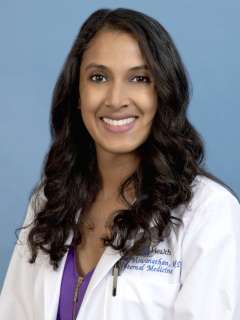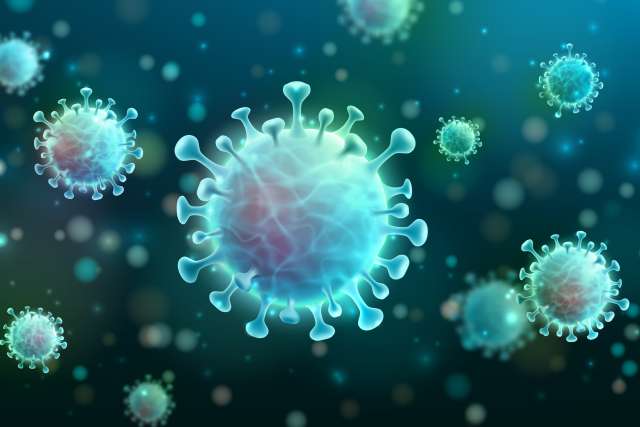Nisha Viswanathan, MD, has been caring for patients with long COVID since before health experts understood there was such a thing.
As an extensivist physician with UCLA Health, Dr. Viswanathan specializes in caring for medically complex patients. And as co-director of the UCLA Health COVID-19 ambulatory monitoring program, she tracked high-risk patients infected with the virus since the start of the pandemic.
That ongoing observation revealed that some patients still experienced symptoms more than 90 days after infection. Dr. Viswanathan gathered a cohort of physicians to look after these patients, launching what ultimately became the UCLA Health Long COVID Program.
Established in July of 2021, the multidisciplinary group now includes eight primary care physicians, two cardiologists, a pulmonologist, a rheumatologist, a neurologist, two psychiatrists and an infectious disease doctor.
“We really have broadened with time, with a lot of physician engagement, as well as the number of patients we see has also gone up rather dramatically,” says Dr. Viswanathan, director of the Long COVID Program. “Our model has been really successful in that multidisciplinary approach. It’s about what are the most important things for the patients and how we can meet them where they’re at.”
Trends in long COVID
Long COVID has changed since Dr. Viswanathan and her colleagues started observing and treating the condition more than two years ago.
“The symptoms that patients are complaining about have really changed throughout the pandemic,” she says. “It’s really dependent on the variant of COVID that they had.”
People infected when the virus first emerged or with early variants were more likely to experience chest pain and shortness of breath, Dr. Viswanathan says, while those infected with omicron variants more frequently report brain fog and fatigue.
“I think long COVID, as a clinical entity, is also evolving based on which variant you’ve been exposed to,” she says.
As exponentially more people have been exposed to the virus over time, the percentage of those experiencing long COVID symptoms has declined, she adds.
About 30% of people infected with the original strain of the virus reported symptoms of long COVID, she says. For those exposed to omicron variants, that number is down to 10% or 11%.
Vaccination appears to be protective against long COVID, Dr. Viswanathan adds: “As people are getting vaccinated and then having COVID, it seems that it is helping prevent that progression.”
Diagnosis and treatment
Long COVID is a “diagnosis of exclusion,” she explains: When tests confirm the absence of other conditions, yet the person is still experiencing lingering symptoms after recovering from acute infection with COVID-19, it’s determined to be long COVID.
While the causes of long COVID still aren’t well understood, research has uncovered several proposed mechanisms underlying the condition, she says.
For many patients, just hearing a doctor acknowledge that long COVID is real and there are things that can help is powerfully healing, Dr. Viswanathan says.
“I can’t tell you the number of patients I’ve seen who’ve cried when I told them, ‘You’re not alone. This is real,’” she says. “We believe you. We’re here for you. And we’re going to work together to figure this out.”
Patients have come from as far away as South Africa to be evaluated by physicians with the UCLA Health Long COVID Program. Dr. Viswanathan and her colleagues send patients home with a list of recommendations to share with their primary care doctor. Patients can be referred to the program through its website or through their primary care doctor at UCLA Health.
While no U.S. Food and Drug Administration-approved treatments exist for long COVID, various interventions are being studied, with some showing encouraging results that make life with long COVID easier. For example, trials at UCLA Health have explored biofeedback – a mind-body technique that helps people control otherwise involuntary body processes -- as a tool to help patients monitor and modify their heart and respiratory rates.
“We did a small trial and saw there was some success, which is promising,” Dr. Viswanathan says. “It’s particularly helpful for people who are having heart- and lung-related issues with their long COVID.”

Another UCLA study is looking at mindfulness as a technique to manage POTS (postural orthostatic tachycardia syndrome), a condition where people experience a surge in heart rate when they stand up that can occur in those with long COVID. By practicing mindful awareness — paying attention to present-moment experiences in a curious, non-judgmental way — patients find symptoms more manageable, Dr. Viswanathan says.
Doctors at the UCLA Health Long COVID Program are also working with UCLA East-West Medicine to incorporate integrative health approaches such as tai chi and qi gong, which promote relaxation and reduce inflammation.
“In my clinical experience, how we’re helping patients get better is using any combination of medication and techniques to reduce inflammation,” Dr. Viswanathan says.
Future of long COVID care
More study and support are needed to meaningfully address long COVID, Dr. Viswanathan says. The condition disproportionately affects people with lower incomes, who are also the least likely to access treatment. Even the low-income patients who are evaluated by the UCLA Health Long COVID Program often find the recommendations too difficult to implement, because they can’t take time off work or don’t have transportation and flexibility to make ongoing treatment practical, she says.
She points to a recent study that found that long COVID is more likely among low-income individuals and people from marginalized groups, whose overall health is affected by systemic bias and access to quality care.
“It’s just so saddening, because when you do see that things work and only certain patients are able to access it, it makes you wish you could do more,” she says.
Meanwhile, research into long COVID causes and treatments continues. Dr. Viswanathan is part of a University of California Board of Regents committee looking into how its institutions can work together to develop a more coordinated approach to long COVID — “especially because no one long COVID program is going to be able to meet the needs of the number of people who need care,” she says.
For many patients, it takes multiple strategies to see symptoms improve.
“We’re taking a real 360-degree approach for these patients,” Dr. Viswanathan says. “Because we're finding no one thing helps get people to the finish line, but it's that combination of things that really helps them overall get control of the symptoms in their life.”




